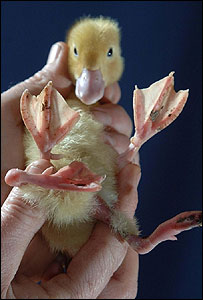
It makes me quite sad to see such a magnificent creature trapped and killed, but finally a colossal squid has been caught intact for academic study. The gigantic 10m squid is believed to be the largest ever found, and here’s an eyewitness account from the trawler’s captain and an image gallery of the squid from The New Zealand Herald:
Captain who caught giant squid relives the moment
6:00PM Friday February 23, 2007
By Fiona Terry for NZPA
The skipper of the Nelson trawler that netted world’s biggest and best specimen of an adult colossal squid says it was a dream come true for him.
“I’ve been a fisherman for 30 years and have always dreamt about things like this,” said John Bennett, 48.
“I’ve read all the famous books like Twenty Thousand Leagues Under The Sea, and this really was like something from fiction.”
He was fishing near Antarctica when the squid was hauled to the surface while dining on a toothfish hooked at a depth of about 1800m.
“It was awesome,” said the skipper of Nelson longliner San Aspiring.
He knew straight away he had caught something very special.
“I knew instantly what it was and that it was the biggest retrieved, because I caught the first one in the same area of the Ross Sea in 2002 and have an interest in keeping abreast with information from around the world.”
Nine crew took two hours to carefully envelop the near dead 10m-long squid in the ship’s cargo net using long poles, then to cradle it and lift it on board with a crane.
The crew thought it would not have survived, if released.
“To see one of these things up so close is a real privilege and I was concerned about preserving it in perfect condition for scientific research, allowing other people to see it and experience it as we had,” Mr Bennett said.
His wife Sue, 46, was also on the 70-day trip, and saw the colossal squid being retrieved, he said.
“We couldn’t imagine anyone catching a bigger more perfect one, especially because we were lucky that the sea conditions were ideal and beautifully calm.”
Freezing fog and a sea temperature of minus 1.5degC made the retrieval “quite tricky”.
Read More



